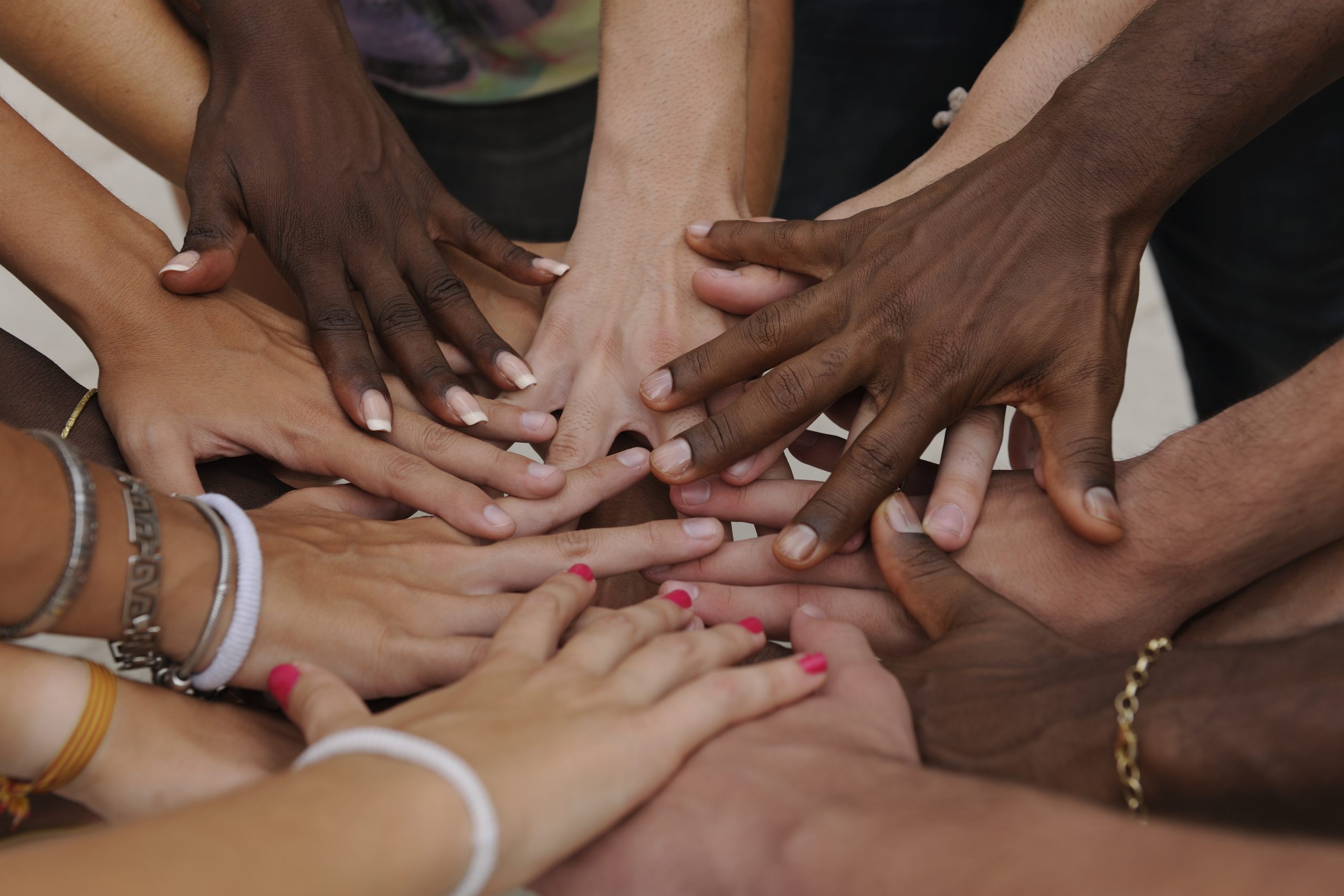Student Affinity Spaces
Designated affinity spaces for students to receive support and to build community.
November is Native & Indigenous Heritage Month, also referred to National American Indian/Alaska Native Heritage Month or Native American Heritage Month. This month commemorates the histories, cultures, and traditions of Native people. Now is the time to learn more about native tribes and familiarize yourself with the indigenous stewards of the land you now occupy.
The goal of observing Native and Indigenous Peoples month is to honor, acknowledge and highlight Native American tribes and nations, as well as their diverse and rich traditions. It’s also a chance to consider and name with accuracy the history of distresses such as theft including the stripping of home and land, forced removal and cultural assimilation in our nation. It is a time to paint the truth. Many Indigenous tribes throughout the country view the holiday known as “Thanksgiving” as a National Day of Mourning. It is essential to recognize and value that Native Indigenous communities survived and are present. Our support has the power to their voices can be centered and heard. Join us, to dispel preconceived notions of indigeneity and to better understand indigenous intersectional identities (Gonzalez, 2023).
Metropolitan State University of Denver resides on the ancestral lands of the Cheyenne, Arapaho, Sioux, and Ute people, all of whom still are in an ongoing relationship with this land. One of the ways we fight the erasure of Indigenous peoples is by recognizing the history that brought settlers, whether voluntary or formerly enslaved, to occupy this land. Here, that history is the Colorado Gold Rush of 1858 and 1859, where settlements like Auraria and Denver as well as other land grabs for gold mining that devastated the land and interrupted Ute and Cheyenne ways of living. Over the course of the next 20 years and the next rushes to take silver from the ground, the Cheyenne and Ute were displaced from this area, their homeland. By knowing this history, we can better understand our place within it and seek to be in the right relationship with the people who were here before us, and with the lands we, too, must steward in our work.
MSU Denver Events
In recognition of Native Indigenous Heritage Month in November, the Center for Equity and Student Achievement (CESA), the Center for Multicultural Engagement and Inclusion (CMEI), MSU Denver’s Lacrosse Club, and the University of Colorado Denver Center for Identity and Inclusion (CII), will be hosting a variety of events to educate the campus on issues that are pertinent to the Native Indigenous communities. It is especially important to understand that Native Indigenous communities still exist and with your support, their voices can be centered and heard. Join us, to dispel preconceived notions of indigeneity and to better understand indigenous intersectional identities. Visit the CMEI website to learn more about these events.
Land Acknowledgement by Gracie RedShirt Tyon, Lakota
“Acknowledging that we reside in the homelands of Indigenous Peoples is an important step in recognizing the history and the original stewards of these lands. Land acknowledgments must extend far beyond words, the United States has worked hard to erase the narratives of Indigenous Peoples over time. Land acknowledgment statements can help to remind us of the history, the contributions and the sacrifices Native peoples have made.
We honor and acknowledge that we are on the traditional territories and ancestral homelands of the Cheyenne, Arapaho, and Ute nations. This area, specifically the confluence of the Platte and Cherry Creek Rivers was the epicenter for trade, information sharing, planning for the future, community, family and ally building, as well as conducting healing ceremonies for over 45 Indigenous Nations, including the Lakota, Kiowa, Comanche, Apache, Shoshone, Paiute, Zuni, Hopi among others.
We must recognize Indigenous peoples as the original stewards of this land and as these words of acknowledgment are spoken and heard, remember the ties these nations still have to their traditional homelands. Let us acknowledge the painful history of genocide and forced removal from this territory and pay our respect to the diverse Indigenous peoples still connected to this land. Let us also give thanks to all Tribal Nations and the ancestors of this place.”
The Social Work DEI Team wants to recognize the breadth of diversity, equity, and inclusion work being done in our Department and the larger MSU Denver community as well as amplify the voices of those from historically silenced communities. Have a story you want to share with us for a chance to be featured on our website? Submit it today!
MSU Denver Department of Social Work has embarked on a journey to provide the necessary supports and resources to the department to ensure that we create a culturally responsive professional and academic learning environment truly rooted in an anti-oppressive social work practice. We invite the Department, students, and partnering agencies to actively engage in and create spaces for critical reflexivity, self-awareness, and discussions around the dismantling of oppressive systems.
The social work profession is built upon a set of core values that recognize the “dignity and worth of the person,” “the importance of human relationships,” and “social justice” (NASW, 2021, preamble). MSU Denver strongly believes that social work education is based on belief that reform is necessary within most social systems, whereby the social work curriculum is uniquely situated to provide the basic understanding and implementation of incremental and significant changes across the micro, mezzo, and macro levels. Understanding how discrimination characterizes and shapes the human experience and development of identity, diversity, equity, and inclusion work must be recognized as foundational to the social work education experience.
Please join the Department as we hold brave spaces to embrace intersectional identifies and confront oppressive systems.
To provide the necessary supports and resources to the department to ensure that we create a culturally responsive professional and academic learning environment truly rooted in an anti-oppressive social practice.
MSU Denver Social Work Department strives to practice, promote, and educate the Council on Social Work Education’s competencies regarding diversity and social justice. Specifically, to engage diversity and difference in practice and advance human rights and social, economic, and environmental justice.
Use affirmative language with yourself, i.e. (I am doing my best, I am beautiful, I am capable, It is okay to need help.)
Sound can be healing. Emotional responses can be stimulated or relaxed through music. Music can be soothing and restorative. Make yourself a playlist and permit yourself to sound out!
Seek counseling or therapy. Everyone has mental health, and it is OKAY to take care of yourself.
Rest your body. It is okay to relax.
Move your body. Exercise and body movement can support increased energy and sleep. You don’t have to know Yoga to try it. YouTube videos, Books, or Classes can all be good methods for all levels.
Try to increase your hydration and decrease your alcohol consumption. Alcohol can be a depressant.
This winter break may be the perfect time to see a medical provider. Taking care of your physical well-being is essential. We have a medical center on campus.
Don’t shame yourself for feeling whatever you feel.
Unplug. Take a break from technology and social media sites. Remember, it is OKAY to unfollow people and pages that make you feel bad about yourself.
Spend time in an environment that supports the uplifting, soothing, and relaxing of your soul.
We are all individuals on a journey hoping to live our best lives while helping others along the way. We are having a human experience. Having a human experience can be fabulous and challenging. Many of us are passionate about social work because we want to pour our compassion and care into individuals, families, groups, and communities. Remember–You are important too. It isn’t always easy to show the same kindness and empathy toward oneself that flows so easily to others. With some intentional practice, your self-compassion and self-care can grow.
DEI Co-Coordinator, OSWSS and Field Liaison, Faculty/Staff Consultations and Support
[email protected] View Full ProfileDEI Co-Coordinator, Neurodiverse & Disabled Student Affinity Group Facilitator and Black-Identified Student Affinity Group Facilitator
[email protected] View Full ProfileBIPOC Student Affinity Group Facilitator and Black-Identified Student Affinity Group Facilitator
[email protected] View Full ProfileWhite-Identified Student Affinity Group Facilitator and Curriculum & More Liaison
[email protected] View Full ProfileMen in Social Work Student Affinity Group Facilitator
[email protected] View Full ProfileFaculty Advisor for the Building Allies of Diversity Student Group
[email protected] View Full ProfileFirst-Generation Student Affinity Group Facilitator
[email protected] View Full ProfileLGBTQAI+ Student Affinity Group Facilitator and White-Identified Student Affinity Group Facilitator
[email protected] View Full ProfileLatin/a/o/x Student Affinity Group Facilitator
[email protected] View Full ProfileNeurodiverse & Disabled Student Affinity Group Facilitator
[email protected] View Full Profile
Designated affinity spaces for students to receive support and to build community.

Designated space for faculty and staff to engage in candid conversations about training, education and support related to teaching and facilitating critical conversations about diversity and social justice.
Student Affinity Spaces are a place where groups of people are drawn together because of shared strong interests, characteristics or engagement in a common activity. The goals of affinity spaces are:
If you have questions about any of the student affinity groups, please email the group facilitator. As meeting times are identified for affinity groups, they will be listed below.
Pedagogy & Diversity (P&D) workshops welcome all social work faculty and staff. The goals of P&D workshops are:
For more information, contact Dr. Julie Clockston via email at [email protected]
Office of Diversity and Inclusion
Center for Multicultural Engagement and Inclusion
In April of 2022, the MSU Denver social work department, with the full support of our Chair Dr. Jessica Retrum, our DEI Coordinator, Dr. Tanya Greathouse, and the DEI committee, had the pleasure of supporting and sponsoring B L A C X E R A.
B L A C X E R A is a student organization at the Metropolitan State University of Denver founded in 2020 by X.
The Purpose: This student organization saw a need to support Black students and the Black community at the height of the double pandemic as we simultaneously grappled with COVID and Black Lives Matter protests to dismantle oppression, racism, discrimination, and abuse of power and police brutality. B L A C X E R A exists at MSU Denver to foster a sense of community and collective support across ethnic intersectional differences for those who identify as Black, African, Afro-Latinx, Caribbean, and mixed-race Black identified students. Black folx are not a monolith, and B L A C X E R A strives to make sure Black identified students do not exist in a vacuum. Recently B L A C X E R A presented a pop-up shop on campus titled HER X HUSTLE celebrating Black women entrepreneurship which featured a panel with Black women entrepreneurs discussing business and women ownership. Please see the video to learn more about B L A C X E R A and incredible business entrepreneurship from the knowledgeable and talented panel. For more information, email [email protected]
We look forward to seeing more events in the future
Asé
MSU Denver DEI Committee
*Asé (pronounced Ah-Shay) is an African word from the Yoruba language, which originated in the country of Nigeria.
If you have any DEI related questions, concerns, curiosities, or if you are in need of a consultation please reach out or submit a contact form!
Social Work DEI Contact FormOffice Location:
Central Classroom Building, Suite 201
Email:
[email protected]
Mailing Address:
Metropolitan State University of Denver
Department of Social Work
PO Box 173362 CB 70
Denver, CO 80217-3362